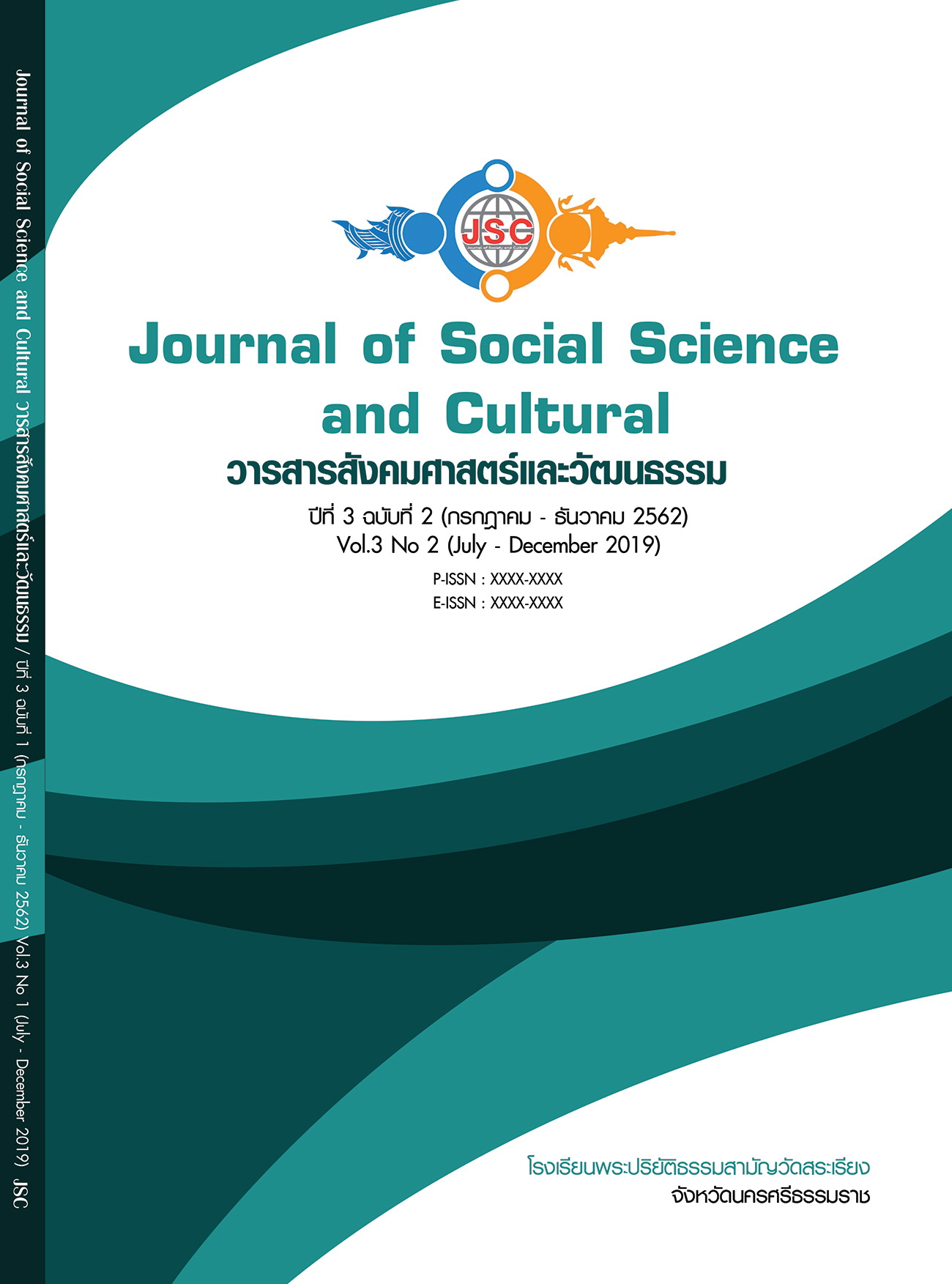THE APPLICATION OF VUTHIDHAMMA PRINCIPLE FOR LIVING IN DAILY LIFE OF STUDENTS IN SAMANAKHUNVITTHAYATHARN SCHOOL, HADYAI DISTRICT SONGKHLA PROVINCE
Main Article Content
Abstract
The objectives of this research were: 1) study the application of Vudḍḥidhamma for living in daily life of students. 2) compare on Vudḍḥidhamma for living in daily life of students and 3) suggest the way to promote on Vudḍḥidhamma for living in daily life of students. The study was quantitative research by proportional stratified random Sampling which all of sample were grade 7 to 9 students at Samankhunvitthayadana School total 265 persons. Data were analyzed using statistic, percentage, average, standard deviation, T-test and F-test for presenting descriptive information in an overview. The research found that: 1) The application of the principles of culture of students Overall is at a high level ( =3.54) by overview 4 aspects: 1) Dhammanudhamapatipati (applying), 2) Yonisomanasikara (investigation), 3) Sappurisasamseva (good company), and 4) Saddhammassavana (Fair hearing). 2) The comparative to apply for the Vudḍḥidhamma of students living in daily life. The students used Vuddhidhamma for living in daily life that was found differences of statistically significant at the level of .001. According to the student with different grade point average aimed that they used Vuddhidhamma for living in daily life that was found differences of statistically significant at the level of .05 and also different of gender and parents occupation that applied Vuddhidhamma for living in daily life that was found not differences of statistically significant at the level of .05. And 3) It was recommended that the suggestion about promote on Vudḍḥidhamma for living in daily life of students was the guidelines to promote the application of the Dharma principles in daily life the most such as: Sappurisasamseva (be friend with a good persons). They should be advised by their parents in the case of personal problems.
Article Details
References
กรมวิชาการ กระทรวงศึกษาธิการ. (2545). พระราชบัญญัติการศึกษาแห่งชาติ พุทธศักราช 2542 (ฉบับที่ 2) และที่แก้ไขเพิ่มเติม พุทธศักราช 2545. กรุงเทพมหานคร: บริษัทสยามสปอรต์ ซินดิเค จำกัด.
คณาจารย์สำนักพิมพ์เลี่ยงเชียง. (2546). นักธรรมชั้นตรีบูรณาการวางแผนใหม่. กรุงเทพมหานคร: โรงพิมพ์เลี่ยงเชียง.
ชนิดา กลัวผิด และคณะ. (2558). การรับรู้และพฤติกรรมของนักศึกษามหาวิทยาลัยราชภัฏนครปฐมที่มีต่อการนำหลักธรรมมาดำเนินชีวิต. ใน รายงานวิจัย. มหาวิทยาลัยราชภัฏนครปฐม.
บุญชม ศรีสะอาด. (2556). วิธีการทางสถิติสำหรับการวิจัย เล่ม 2. กรุงเทพมหานคร: สุวีริยาการพิมพ์.
พรรตนฤน เพชรวิวรรธน์. (2545). การศึกษาการปลูกฝังคุณธรรมให้แก่นักเรียนประถมศึกษาในกรุงเทพมหานคร. ใน วิทยานิพนธ์ศึกษาศาสตรมหาบัณฑิต สาขาวิชาประถมศึกษา. จุฬาลงกรณ์มหาวิทยาลัย.
พิทูร มลิวัลย์. (2528). คู่มือการศึกษาโพธิปักขิยธรรม. (พิมพ์ครั้งที่ 2). กรุงเทพมหานคร: กรมการศาสนา กระทรวงศึกษาธิการ.
ไพรัช พื้นชมภู และคณะ. (2561). รูปแบบการนำหลักวุฑฒิธรรม 4 ไปใช้ในการส่งเสริมการเรียนรู้ของนักเรียนระดับมัธยมศึกษา เพื่อความเจริญงอกงามแห่งปัญญา. วารสารวิชาการธรรมทรรศน์, 18(2), 153-164.
มหาจุฬาลงกรณราชวิทยาลัย. (2557). อรรถกถาพระไตรปิฎกภาษาไทยฉบับมหาจุฬาลงกรณราชวิทยาลัย. กรุงเทพมหานคร: โรงพิมพ์มหาจุฬาลงกรณราชวิทยาลัย.
รัฐธรรมนูญแห่งราชอาณาจักรไทย พ.ศ. 2560. (2560). ราชกิจจานุเบกษา. เล่ม 134 ตอนที่ 40 ก (6 เมษายน พ.ศ. 2560).
โรงเรียนสมานคุณวิทยาทาน. (2562). ฝ่ายข้อมูลนักเรียนโรงเรียนสมานคุณวิทยาทาน อำเภอหาดใหญ่ จังหวัดสงขลา. เรียกใช้เมื่อ 19 ธันวาคม 2562 จาก http://skvt.ac.th /datashow_11415
ศรีเพ็ญ สิงห์แก้ว. (2561). ศึกษาวิเคราะห์หลักพุทธธรรมเพื่อการส่งเสริมพัฒนาการบุตรของหน่วยสาธิตการสร้างเสริมสุขภาพเด็กเล็ก คณะพยาบาลศาสตร์ มหาวิทยาลัย เชียงใหม่. วารสารพุทธศาสตร์ศึกษา, 9(1), 67-78.
สำนักงานคณะกรรมการการศึกษาขั้นพื้นฐาน. (2545). ระบบการประเมินคุณภาพและมาตรฐานการศึกษาแห่งชาติ. กรุงเทพมหานคร: คุรุสภาพลาดพร้าว.
Cronbach, L. J. (1990). Essentials of psychological testing. (5th ed.). New York: Harper Collins Publishers.
Krejcie, R. V. & Morgan, D. W. (1970). Determining Sample Size for Research Activities. Educational and Psychological Measurement, 30(3). 607-610.
Likert, R. (1967). The Method of Constructing and Attitude Scale. In Fishbeic, M (Ed.), Attitude Theory and Measurement (pp. 90-95). New York: Wiley & Son.


